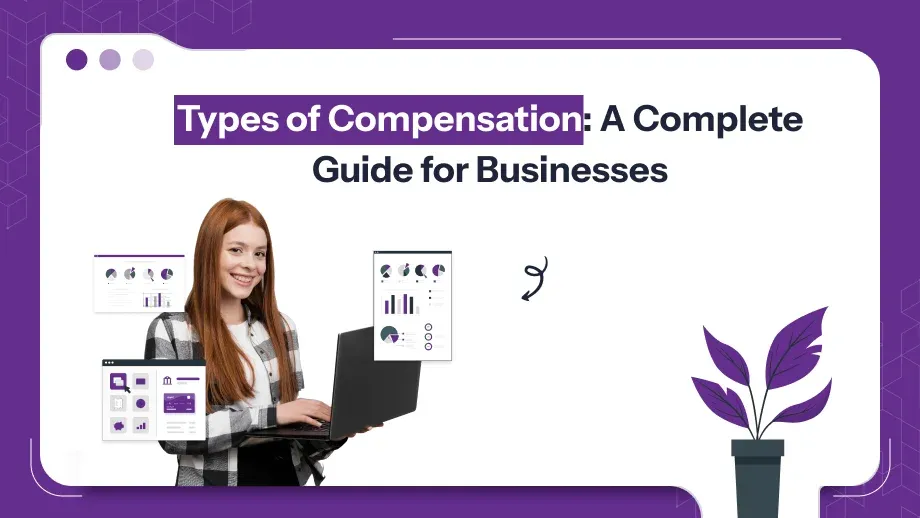
For companies looking to attract, keep, and inspire people, it is critical to comprehend the many forms of remuneration. Paying workers is only one aspect of a well-designed compensation plan; it also fosters a sense of worth and supports company objectives. Types of compensation and benefits & bonuses, and salary all have a part to play in creating a productive staff.
It is crucial for HR professionals and company executives to put into practice efficient pay plans. The process can be streamlined with the use of tools like payroll software, hr and payroll software, and Payroll HR Systems, which ensure accuracy, fairness, and compliance. This guide covers the different types of compensation, along with practical advice for handling them well.
Which Types of Compensation Are There?
All of the financial and other advantages that workers receive in return for their labor are referred to as compensation. These incentives encourage workers to give their best work in addition to providing a means of subsistence. In general, types of compensation is divided into three Categories: Equity-based rewards, indirect compensation, and direct remuneration. Each of these categories makes an individual difference to the entire experience of an employee.
Direct Compensation
This includes all cash payments provided to employees for their work. Examples include:
- Salaries: Regularly scheduled, fixed payments that are typically made every month or every two weeks.
- Wages: Hourly payment, usually given to non-exempt workers.
- Bonuses: Performance-based compensation linked to meeting or achieving set goals.
Indirect Compensation
This involves non-cash benefits that improve employees’ quality of life and sense of security. Common examples include:
Health Insurance: covers dental, medical, and vision expenses.
Paid Time: Off It includes holidays as well as sick leave and private days.
Retirement Plans: Pension plans sponsored by employers and 401(k) contributions.
Equity-Based Compensation
Equity-based rewards, like stock options as well as restricted stock units (RSUs) give employees an interest in the business’s growth. They are especially popular in businesses that are in the early stages of growth and those with high growth.
In types of compensation in HRM, both monetary as well as rewards that are not monetary are essential. Rewards that are monetary make that employees are financially secure as non-monetary incentives can boost job satisfaction and loyalty. A well-balanced and balanced reward strategy does not just boost employees’ morale, but it also helps ensure that firms are competitive in their particular sectors.
Direct Compensation
Direct compensation refers to the immediate monetary rewards employees receive. It is straightforward to track and distribute using tools like Payroll HR Systems and popular payroll software.
Base Pay
It is the fixed pay that employees get, for example one-time salary or hourly pay. It is the basis of any pay package. It is usually determined by work roles, industry norms, and market rates.
Variable Pay
Variable compensation is a combination of performance-based rewards as well as commissions and incentives. They motivate employees to meet specific objectives and help them achieve corporate goals. A lot of businesses depend on payroll software in order to control and track these payments accurately.
Example: A salesperson gets a quarterly bonus in the event of exceeding their sales targets.
Ready to streamline your compensation strategy?
Explore powerful HRMS and payroll software to attract, retain, and motivate top talent today!
Indirect Compensation
Indirect compensation can include bonuses and other perks designed to improve employees’ overall health and well-being, however, they do not receive direct payment in cash.
Benefits
- Health Insurance: Dental, medical, and vision coverage.
- Retirement Plans: Employee-sponsored 401(k) contributions, or pension plans.
- Paid Time off: vacations or sick time, as well as parental time off.
Perks
- Flexible Work Schedules: Options like remote work or customized hours.
- Professional Development: Training programs, certifications, and tuition reimbursement.
Using HRMS & payroll software, businesses can efficiently manage these benefits, ensuring employees receive what they are entitled to while maintaining compliance with labor laws.
Flexible work schedules for employees: Choices such as remote work, or a set of working hours.
Professional Development: Training courses including certifications, training, as well as tuition reimbursement.
With the help of small business payroll software can effectively handle these benefits, making sure that workers receive the benefits to which they are entitled and remain in conformity with the labor laws.
Equity-Based Compensation
Equity-based compensation can be an effective instrument to align employee’s interests in line with the long-term goals of business. This type of reward allows employees to be part of the business’s success and encourages the company’s loyalty and motivation.
Stock Options
Employees have the option to purchase shares of the company at a set cost. This is an incredibly common practice for growing and new businesses as well as startups.
Restricted Stock Units (RSUs)
RSUs can be a part of the employee’s pay but have restrictions like vesting time. RSUs are usually used by top executives and high performers.
With equity-based rewards, companies can draw the best talent and keep key employees by making them feel that they’re part of the success of the business.
Strategic Alignment of Compensation
Compensation strategies should align with business goals to ensure consistency and fairness. Here’s how:
- Benchmarking: Compare your compensation packages with industry standards using market data.
- Legal Compliance: Stay updated on labor laws and regulations to avoid disputes.
- Employee Feedback: Regular surveys to assess employee satisfaction with existing benefits.
Using tools like payroll HR systems simplifies this process. They enable companies to track compensation trends, calculate variable pay accurately, and ensure compliance with relevant laws.
Current Trends in Compensation and Benefits
The world of compensation is continuously changing. Here are a few trends that businesses ought to take into consideration:
- Performance-Based Pay: Employees get awarded based on the outcomes of their performance which boosts productivity.
- Flexible Benefits: Customized benefits plans permit employees to select the best option for them like extra health insurance coverage, or even childcare help.
- Life Balance and Work: Perks like remote work choices and wellness programs are now important to keep the best talent.
Being aware of these changes makes sure your compensation plan stays competitive and appealing for employees who are currently employed and those looking to join the company.
Role of Payroll Software in Compensation Management
Managing compensation manually is challenging, especially for businesses with large teams. This is where payroll software, HRMS & payroll software, and Payroll HR Systems step in.
Key Features of Payroll Software:
- Automation: Streamlines salary calculations, tax deductions, and bonus payouts.
- Integration: Links with HRMS software to manage benefits and time tracking.
- Compliance: Keeps businesses aligned with regional labor laws and tax regulations.
- Reporting: Provides insights into compensation trends and budget allocation.
Key Benefits:
- Automates salary calculations and tax deductions.
- Tracks benefits and perks for individual employees.
- Generates detailed compensation reports for business insights.
Investing in the right popular payroll software not only simplifies processes but also reduces errors and enhances employee satisfaction.
What type of options for compensation packages will allow you to draw and keep employees?
The correct types of compensation are an essential tool in attracting and keeping the best talent in today’s highly competitive employment market. Employers look beyond the salary when evaluating job opportunities. They appreciate the benefits, perks, and the potential for advancement. An attractive compensation package that’s well-rounded is in line with the expectations of employees and promotes happiness and loyalty.
The base pay is the basis of any types of compensation program and helps employees feel financially safe. The addition of variable pay, such as bonuses and incentive programs will motivate employees to achieve expectations. Benefits like comprehensive healthcare insurance, retirement plan as well as paid time off can increase employee satisfaction and help meet employees’ longer-term requirements. Benefits that are not monetary, such as flexibility in work schedules and health programs, are appealing to those who are seeking to balance their work and life.
The equity-based reward, which includes stock options, or restricted stock units (RSUs) can be particularly successful in keeping the top performers. They not only offer incentives for financial gain, but they also offer employees an interest in the firm’s growth as well as long-term dedication.
Utilizing tools such as payroll software, companies are able to customize their compensation programs in line with current trends as well as individual preferences. Continuously reviewing and making changes to these plans ensures that they’re competitive, assisting companies attract talented candidates and keeping top performers in the future. A well-designed package is a sign of the company’s dedication to the employees it employs.
Conclusion
Compensation goes beyond giving employees. It’s about creating a system that encourages effort, draws talented employees, and is aligned with the business goals. From direct pay like salary as well as bonuses, and indirect rewards like perks and benefits being aware of the types of compensation management is vital to the success of your business.
A structured compensation software will not just increase satisfaction among employees however it also increases productivity and lowers the rate of turnover. To simplify the process of managing compensation firms should look into using software like HRMS and payroll software that automatize procedures, ensure accuracy, and make sure that they comply with labor regulations. This approach will help firms to compete in an ever-changing market.







